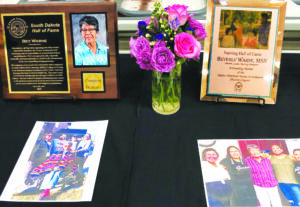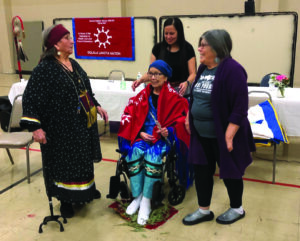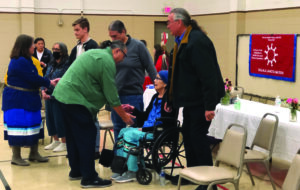Warne honored for improving lives of Native Americans

Beverly Stabber Warne Honoring Feb. 24, 2024 at the Mother Butler Center. (Photo courtesy of City of Rapid City)
RAPID CITY – “My work is with Native students. All of my work is with Native students and I love it. I could be retired but I choose not to.” That is Beverly Warne (Oglala Lakota) speaking about her experience and her work at the Sixth Annual Conference on Native American Nutrition that was held in Minnesota in 2023.
The latest recognition honoring her work as a nurse, mentor and leader, was held in Rapid City as Mayor Jason Salamun proclaimed February 24, 2024 Beverly Stabber Warne “Hante Win” Day. The proclamation lauded Warne for making health, well-being, healing and community service her life’s work. Her most recent accomplishment was the creation of the Native American Nursing Education Center in Rapid City.
It was a packed house for the Rapid City honoring at the Mother Butler Center with many students in attendance who shared their grateful stories of Warne’s leadership and how her mentorship was important to their success.

Pansy Hawk Wing, Amy Sazue and Karen Artichoker showing support in honor of Beverly Warne at the Mother Butler Center on Feb. 24. 2024. (Photo courtesy of City of Rapid City)
Born on the Pine Ridge Reservation in 1939, Warne had grown up speaking Lakota as her first language. She credits her maternal grandfather, whom she called Lala’, for teaching her Lakota values, in the Lakota way.
In her speech at the conference in Minnesota, Warne showed on screen a visual of Lakota values – the Four Directions which are Wisdom, Courage Fortitude Generosity as well Honor and Respect. Humility is at the center of the circle. Warne said she never heard Lala’ give the definitions of these words. Instead, he would sing of the values in his morning and evening prayer. “He sang a lot of stories about Humility. I think he knew what was coming for us at the time. This was before World War II. He didn’t tell us the meaning. He would sing them.”
Federal regulations had limited the movement of Native Americans from their reservations. This was followed by the era of assimilation and efforts to forcibly impose English and Christian education on Native American children. Tribes were eventually recognized officially as citizens by the federal government in 1924. A period followed when the federal government stopped allotting tribal reservations and emphasized tribal self-governance instead. By the 1930’s and 1940’s, the federal government proposed ending federal obligations to tribes. It was at this time that Warne was born – on the cusp of the termination era.
Many Native Americans in the first half of the twentieth century who did not live on the reservation lived on the margins of the white community. It was the scenario all over the nation and was no different in Rapid City. Many Native Americans were unable to find work on the reservation and came to the city to look for work. Warne’s father, having returned to Pine Ridge from WWII was unable to find work on the reservation and so brought his family to Rapid City.
Warne had attended boarding school in Pine Ridge. It was there on her first day in kindergarten that she heard English spoken for the first time. She has said that it wasn’t until her family relocated to Rapid City that she experienced intense racism. This was a time when open discrimination and hostility toward Native Americans was accepted. She remembers businesses proudly and openly displaying signs that read “no Indians allowed.”
Her family lived in one of the two camps located outside of city limits. No land had been appropriated for use by Native Americans other than the Rapid City Indian School. Over time, it was converted to a Civilian Conservation Corps camp, the Sioux Sanitarium in 1938 and served as a tuberculosis clinic for Native Americans until the 1960’s, when it eventually transitioned to a full service medical clinic for Native Americans. None of the land was ever used for Native American housing.
Warne would eventually go to nursing school with the help of a mentor or two and graduated from St. John’s McNamara School of Nursing in Rapid City. Warne earned her Baccalaureate and Master’s Degrees in Nursing from Arizona State University.
Warne served as a nurse in numerous healthcare situations – public, private, military, and international. Warne also worked with the Indian Health Service, in home and school settings. Perhaps her greatest impact has been as a teacher.
As a member of the faculty at Mesa Community College and Arizona State University, she taught nursing and cultural courses that brought a special perspective to the program given her cultural background and lifestyle.
Warne credits her success to her interest in reading, having a sense of curiosity and especially to her grandfather sharing his Lakota values. This helped her know who she was and that helped build her self-confidence.
Warne has said that many of her people didn’t have the chance to learn these values due to the boarding school system and forced assimilation. “The colonizers didn’t want us to be collective in our thinking, they wanted us to be competitive. They wanted us to become Christians and not practice our traditional spirituality, including the ceremonies and our daily practices.”
She says that the student nurses are aware of the health disparities that Native Americans face and that the majority of the chronic health issues are preventable. “We know that in our Lakota perspective, nutrition, or the food we eat, is much more than the physical components of our foods. There’s a very strong spirituality embedded in everything we do and it includes what we eat.” She said that nutritional health is difficult to achieve because of the consequences of poverty.
During her time at Arizona State University, Warne had developed a program to assist Native American/Alaska Native students to get their nursing degrees. Hearing of Warne’s return to South Dakota, SDSU asked if she would be interested in creating a similar type program. At the time, SDSU had a low retention rate for Native American students which they attribute to the challenges Native American students have to overcome when seeking higher education. Since then, the Native American Nursing Education Center and the Wicozani-Life Pathway in Nursing program in Rapid City is credited with bringing the retention rate up to 96-percent.
At the conference in Minnesota, Warne quoted Sitting Bull who in 1872 said, “Let us put our minds together and see what life we can make for our children.” Warne told the audience that’s exactly what they are doing today, “putting your minds together, opening your hearts and your minds and listening to all these words of wisdom and words that people worked hard to prepare for you to hear. What he said that many years ago is still true today, we all need to do that, just listen to each other, put aside anything you might have predisposing that person standing up there trying to teach what they have learned.”

Paula Long Fox, Sandy Keith, Delores Allen, Don Warne, Bruce Long Fox and James Warne all in attendance to honor Beverly Warne. (photo courtesy of City of Rapid City)
Warne said it’s her duty to share the information that she has learned. She spoke of the positive changes in Rapid City that there are “community-wide” efforts to make Rapid City an inclusive place. “These efforts help young Lakota people know who they are historically and culturally and language-wise so that they can live in both worlds.”
(Contact Marnie Cook at staffwriter@nativesunnews.today)
The post Warne honored for improving lives of Native Americans first appeared on Native Sun News Today.
